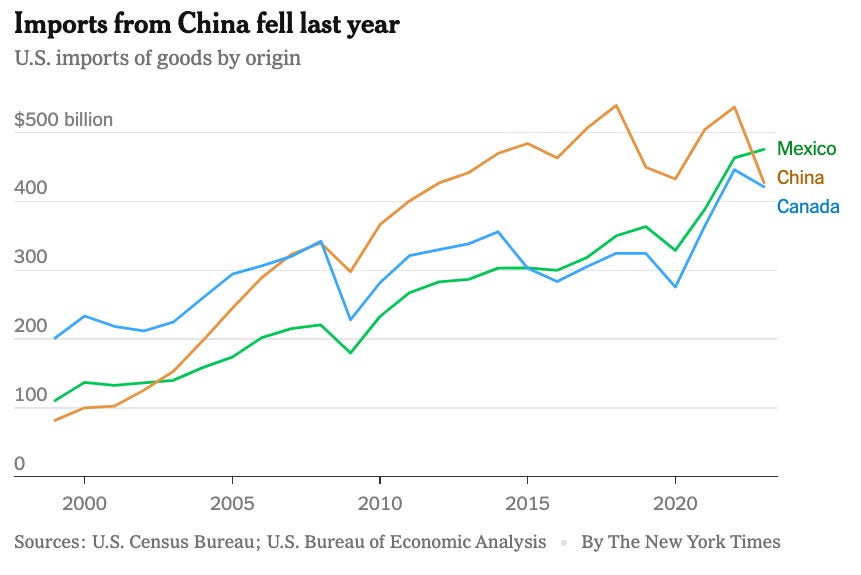📈 first Derivative [107]
🥽 Vision Pro—🇰🇵 North Korea—🇪🇬 Egypt vs. China—🇲🇽 Mexican trade—🇻🇪 Venezuela threatens—🇺🇸 US oil
🎬 As some of you may know, my work the last few years has mainly been in film & TV. There’s always a lot of stuff I read about that world that I like in the fD vein but it’s a bit much for the generalist approach I try to take here. I’ve been debating for a couple of months now whether or not to start a separate newsletter for that or maybe do it as a vertical on here. If you have any thoughts or are interested in that content, shoot me an email.
🥽🤌 I went to the Apple store this week to try the Vision Pro. Wrote some thoughts (and soft launched my face):
Big takeaways: incredible UI, very good for watching TV & movies now, very good for watching sports in the future.
❤️🎥 Valentine’s Day movie list:
Bergman Island (2021) — a filmmaking couple retreat to a summer island to work on their respective screenplays. Fiction and reality begin to blur. One of my favorites in recent years and I’m due for a rewatch
Before Midnight (2013) — the last and my favorite film in the Before trilogy
The Last Days of Disco (1998) — charming film from one of my favorite directors, Whit Stillman. Makes me nostalgic for a New York I never knew, even as the film lovingly satirizes the scene
About Time (2013) — fun, existential, life-affirming
Cold War (2018) — a not fun but moving story about love, art, and communism. I love this trailer so much. Pair it with Florian Henckel von Donnersmarck’s The Lives of Others
My Night at Maud’s (1969) — not as beautiful as Rohmer’s color films but a very smart and funny sexual comedy. Probably my favorite of his
The Umbrellas of Cherbourg (1963) — eye-popping Technicolor romance. Every line in this movie is sung. An inspiration for movies like La La Land and…
Rye Lane (2023) — a south London fisheye romance that takes its color inspiration from Umbrellas
Good reading,
—TK
Also a correction for the last issue: Boeing merged with McDonnell Douglas in 1997, not 1977. Per usual, I recommend reading the web version of these issues where I’ll edit live and add a few things too.
[Kim Jong Un], the third-generation leader, said the country would scrub any reference to South Koreans as fellow countrymen or partners for reconciliation. Instead, North Korean law would reclassify its southern neighbor as a foreign country, a hostile state and one that constitutionally should be occupied, subjugated and reclaimed in the event of war.
While North Korea has a long history of aggressive rhetoric and saber-rattling, I think the recent Russo-Ukraine war has renewed focus on taking aggressors’ intentions at face value, especially when accompanied by explicit changes in posture and ideology.
Breaking it down into intent & capability, regarding intent there was a piece published by two North Korea analysts (Robert L. Carlin, Siegfried S. Hecker) last month that argued that “Kim Jong Un has made a strategic decision to go to war”. The piece argues that while North Korea pursued a policy of engagement with the US from 1990 to 2019, the failed US-DPRK summit in Hanoi led Kim and the North Korean government to reevaluate its entire approach. Tanner Greer has a good thread breaking it down.
Regarding capability, this report from the Atlantic Council last fall highlighted the “dramatically increased risk of strategic deterrence failure on or around the Korean Peninsula in the next five to ten years”. Even if a full-scale attack is not plausible, the report lays out how North Korea’s increasing conventional and nuclear capabilities effectively give it growing room to “escalate without triggering a regime-ending response”. A key consideration presented is North Korea’s second-strike nuclear capabilities which “challenge the credibility of US deterrence by punishment”, especially its capacity to strike Guam, Alaska, and the continental United States.
🇪🇬🇨🇳🎧 I listened to a great podcast episode interviewing, Peter Hessler, who used to be a China correspondent for The New Yorker and wrote River Town, a very well-written book about his two years in the Peace Corps teaching in a small city in China. Hessler, who moved to Cairo (in time for the Arab Spring) after his time in China, compares and contrasts the cultures and histories of Egypt and China, as well as the differing experiences of the protest movements in both places. I think Hessler is an incredible prose writer with a keen eye
🇲🇽🇺🇸🇨🇳 Mexico overtook China as the US’s top trade partner, for the first time in two decades
While part of that is probably due to both countries “decoupling” their economies from each other’s:
Some economists caution that the U.S. reduction in trade with China might not be as sharp as bilateral data shows… some multinationals have shifted portions of their manufacturing out of China and into other countries but continued sourcing some raw materials and parts from China.
In other cases, companies may simply be routing goods that are actually made in China through other countries to avoid U.S. tariffs.
🇻🇪🇬🇾 Venezuela is moving its military closer to the border, escalating its threat to annex most of the territory of its neighbor, Guyana, whose recent large oil discoveries have caught Maduro’s eye. Following up on my post on this in December
🇺🇸🛢 The US is the largest crude oil producer in the world and broke production records last year. I wrote a bit about this last summer




